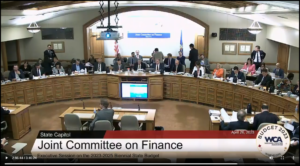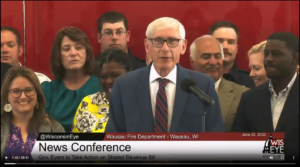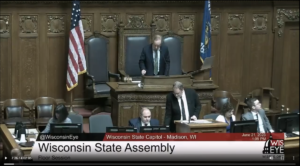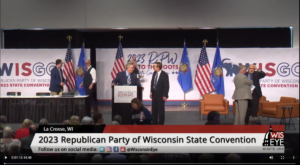
In this update:
- Budget Updates
- Administration Updates
- Legislative Updates
- Election Updates
- Fundraising Opportunities
Budget Updates
JFC holds exec session on UW System, General Fund Taxes, Compensation, and more
On Thursday, the Joint Finance Committee held an executive session where it took action on the following sections of the budget: UW System, Budget Management and Compensation Reserves, WHEDA, Shared Revenue and Property Tax Relief, General Fund Taxes, and Miscellaneous Items. Thursday’s session concludes JFC’s work on crafting the budget. The budget bill will now be sent to the full Legislature where both chambers are expected to hold floor sessions next week. Including JFC’s action on Thursday, Budget Director Bob Lang estimated the balance in the state’s General Fund at the end of the FY 23-25 biennium would be about $580 million which, according to Mr. Lang, “is quite comparable to where the governor was at the end of 2024-2025 also.” Each section of the budget was passed along party lines with a 12-4 vote.
General Fund Taxes
The GOP motion passed by JFC includes a plan to reduce taxes by $3.5 billion and consolidate the state’s current four tax brackets into three tax brackets. Under the GOP plan, the current top tax bracket of 7.65% would be reduced to 6.5%, while the current middle tax brackets of 5.3% and 4.65% would be consolidated into a single bracket of 4.4%. The lowest tax bracket would drop from 3.54% to 3.5%. Republicans noted the average tax break under the proposal would be $573 per filer in 2023 and said the proposal was geared towards the middle class. Democrats on the other hand opposed the proposal, saying the cuts benefitted wealthier individuals the most and also would result in unnecessary cuts to government services. Gov. Evers had originally proposed a $1.2 billion tax cut that included a 10% state income tax cut for individuals making less than $100,000 and married couples or joint-filers making at or below $150,000. The governor’s spokesperson, Britt Cudaback, was also critical of the proposal saying the GOP was “doubling down on tax breaks for wealthy millionaires and billionaires instead of prioritizing relief for working families.”
UW System
The GOP motion passed by JFC reduced UW System’s budget by $32 million and cut 330.8 GPR positions beginning in 2023-24, 142 vacant positions and 188.8 positions related to diversity, equity, and inclusion (DEI). Gov. Tony Evers had originally proposed a $305 million increase for UW System. However, the motion does put $32 million in a supplemental appropriation that would allow UW System to petition JFC for a restoration of the funds in a Section 13.10 meeting. Assembly Speaker Robin Vos had previously called for the DEI cuts and said removing DEI-related programming from public universities is the “single most important issue that we are facing as a people, as a nation and as, really, humanity,” In response to the reduction in DEI positions, Rep. Evan Goyke (D) told GOP legislators to “stop freaking out that you think you’re going to lose something, that somebody that doesn’t look like you is going to win something.”
Budget Management and Compensation Reserves
The GOP motion passed by JFC boosted pay for state employees by over $700 million with $344 million going toward pay increases for Corrections officers. “These are major investments in public safety,” Rep. Mark Born (R) said, referring to the pay raise for Corrections officers. “It’s a top priority for the people of Wisconsin and a top priority for Republicans.” The motion also covered a pay increase for state and UW System employees by 4% in FY 2024 and 2% in FY 2025. Gov. Evers had originally proposed state workers receive raises of 5% and 3%. Democratic JFC member Rep. Tip McGuire said the GOP motion did not go far enough in ensuring state workers are receiving competitive wages. “If you want to grow Wisconsin, we need to invest in the workers of Wisconsin,” Rep. McGuire said.
Wisconsin Housing and Economic Development Authority (WHEDA)
The GOP motion passed by JFC allocated $525 million for a package of workforce housing bills signed into law by Gov. Evers on Thursday. Funding was included for a number of rehabilitation loan programs including for workforce housing, residential housing infrastructure, Main Street housing, and commercial-to-housing conversions.
Read all budget motions from JFC’s Thursday meeting: click here
Administration Updates
Evers signs shared revenue, K-12 education funding bills as part of deal with GOP leaders
Gov. Tony Evers on Wednesday signed two bills (Assembly Bill 245 and Senate Bill 330) into law that would increase shared revenue payments to local governments by more than $1 billion, as well as increase K-12 per pupil funding for traditional public schools, public charter schools, and the state’s private school choice programs. The two bills are part of a deal negotiated between Gov. Evers, Assembly Speaker Robin Vos, and Senate Majority Leader Devin LeMahieu. At the signing ceremony for the bill package, Gov. Evers was joined by Republican and Democratic legislators, as well as local government officials from across the state. “I believe the state should be doing its part to support our local partners and ensure our communities have the resources they need to meet basic and unique needs alike, period, and I’ve always believed that supporting our local communities is an area where we could work to find common ground and bipartisan support, and that’s exactly what we did,” Gov. Evers said.
No Republicans spoke at the signing ceremony, but the bill’s co-author Sen. Mary Felzkowski (R) did praise the new law on Twitter. “This historic investment in our local communities will ensure every town, village, city, and county in Wisconsin has the resources they need to provide necessary and expected government services like police, fire, and EMS,” Sen. Felzkowski wrote. “This is a monumental day for Wisconsin, and a true testament of what can get done when we work across the aisle.”
Evers signs affordable housing bill package
 Gov. Tony Evers announced Thursday that he had signed a package of five bills to increase access to affordable housing in the state. “Access to safe, reliable, and affordable housing statewide is an absolutely critical part of addressing Wisconsin’s long-standing workforce challenges,” said Gov. Evers. “But even beyond that, making sure we have safe, reliable, affordable housing statewide is about more than ensuring folks have a roof over their head a night. Housing ensures our kids have the stability to bring their best, full selves to the classroom, that hardworking folks can live in the communities they work in, which is important for the long-term strength of our economy, that individuals working to overcome substance use disorder have a safe place to focus on recovery, and that folks reentering our communities can do so safely.”
Gov. Tony Evers announced Thursday that he had signed a package of five bills to increase access to affordable housing in the state. “Access to safe, reliable, and affordable housing statewide is an absolutely critical part of addressing Wisconsin’s long-standing workforce challenges,” said Gov. Evers. “But even beyond that, making sure we have safe, reliable, affordable housing statewide is about more than ensuring folks have a roof over their head a night. Housing ensures our kids have the stability to bring their best, full selves to the classroom, that hardworking folks can live in the communities they work in, which is important for the long-term strength of our economy, that individuals working to overcome substance use disorder have a safe place to focus on recovery, and that folks reentering our communities can do so safely.”
The housing bills signed by Gov. Evers include:
Assembly Bill 264, now 2023 Wisconsin Act 14:
- Authored by Rep. Armstrong (R-Rice Lake), 2023 Wisconsin Act 14 creates a residential housing infrastructure revolving loan fund program, allowing a residential housing developer to apply to the Wisconsin Housing and Economic Development Authority (WHEDA) for a loan to cover the costs of installing, replacing, upgrading, or improving public infrastructure related to workforce housing or senior housing.
Assembly Bill 265, now 2023 Wisconsin Act 15:
- Authored by Rep. Karen Hurd (R-Fall Creek), 2023 Wisconsin Act 15 creates a main street housing rehabilitation revolving loan funding program, allowing an owner of rental housing to apply to WHEDA for a loan to cover the costs of an improvement to workforce housing to maintain it in a decent, safe, and sanitary condition or to restore it to that condition.
Assembly Bill 266, now 2023 Wisconsin Act 16:
- Authored by Rep. Scott Krug (R-Arkdale), 2023 Wisconsin Act 16 establishes a new procedure for certiorari review of local land use decisions regarding residential development, providing that the new procedure for certiorari review is the only review available for a decision of a political subdivision regarding an application for approval, such as a permit or authorization for building, zoning, driveway, stormwater, or other activity related to residential development.
Assembly Bill 267, now 2023 Wisconsin Act 17:
- Authored by Rep. William Penterman (R-Columbus), 2023 Wisconsin Act 17 makes various modifications to the Workforce Housing Rehabilitation Loan Program administered by WHEDA;
Assembly Bill 268, now 2023 Wisconsin Act 18:
- Authored by Rep. Rob Summerfield (R-Bloomer), 2023 Wisconsin Act 18 creates a commercial-to-residential conversation revolving loan fund program under WHEDA, allowing a developer to apply to WHEDA for a loan to cover the costs of converting a vacant commercial building to workforce housing or senior housing; and
- Requires the housing associated with a conversion loan must be new residential housing for rent or for sale and must consist of 16 or more dwelling units.
Evers appoints Smith to the WEDC Board of Directors
 Governor Evers has appointed Willie Smith to the Wisconsin Economic Development Corporation’s Board of Directors. Smith’s appointment fills a vacancy created by the resignation of Joe Kirgues from the board. Smith has over 25 years of experience in the real estate and economic development industry with various leadership and real estate finance positions. He earned his associate’s degree in Commercial Real Estate from Marquette University and a Bachelor of Business Administration from Cardinal Stritch University. He is a Wisconsin licensed real estate broker and a National Development Council certified economic development finance professional. On his appointment, Governor Evers stated, “Willie’s combined years of professional experience and demonstrated commitment to and success in promoting community economic development efforts will make him an asset to the WEDC Board of Directors. Willie’s input and insight will help drive the mission of this board in its work to support WEDC’s efforts to bolster Wisconsin businesses, invest in local ingenuity and entrepreneurship, and continue the state’s positive economic outlook and prosperity for years to come.”
Governor Evers has appointed Willie Smith to the Wisconsin Economic Development Corporation’s Board of Directors. Smith’s appointment fills a vacancy created by the resignation of Joe Kirgues from the board. Smith has over 25 years of experience in the real estate and economic development industry with various leadership and real estate finance positions. He earned his associate’s degree in Commercial Real Estate from Marquette University and a Bachelor of Business Administration from Cardinal Stritch University. He is a Wisconsin licensed real estate broker and a National Development Council certified economic development finance professional. On his appointment, Governor Evers stated, “Willie’s combined years of professional experience and demonstrated commitment to and success in promoting community economic development efforts will make him an asset to the WEDC Board of Directors. Willie’s input and insight will help drive the mission of this board in its work to support WEDC’s efforts to bolster Wisconsin businesses, invest in local ingenuity and entrepreneurship, and continue the state’s positive economic outlook and prosperity for years to come.”
Legislative Updates
Assembly holds floor session
On Wednesday the Assembly held a floor session where they passed 15 bills on topics ranging from reading instruction to alcohol regulation. Notable bills include:
The bill, authored by Rep. Joel Kitchens (R-Sturgeon Bay), would establish the Office of Literacy in the Department of Public Instruction and contract 64 full-time literacy coaches who would help teachers implement the science of reading, a literacy model structured around phonological awareness, phonemic awareness, phonics, building background knowledge, oral language development, vocabulary building, instruction in writing, instruction in comprehension, and reading fluency. The amended bill passed the Assembly 67-27 with substantial bipartisan support that included eight Democrats and all but two Republicans voting in favor. “This is really, really important legislation,” Rep. Kitchens said. “There’s always going to be something someone doesn’t like, but we need to get this done … Pushing this down the road just makes it much more likely it will fall apart.” DPI Superintendent Jill Underly released a statement confirming an agreement had been reached for the agency to support the bill. “Over the past few months, we have had very productive conversations with legislators as we worked together on creating a reading package that puts the needs of our kids first,” said Dr. Underly. “Today, we have reached an agreement on how to do that.” Rep. Kitchens said he was optimistic that Gov. Evers would sign the measure should it pass the Senate.
The bill, authored by Assembly Speaker Robin Vos (R-Rochester), would create significant changes to the state’s alcohol industry. The proposal passed the Assembly 90-4 with three Democrats and one Republican voting in opposition (Reps. Clinton Anderson, D-Beloit, Marisabel Cabrera, D-Milwaukee, Jenna Jacobson, D-Oregon, and Rick Gundrum, R-Slinger). The measure makes a number of clarifications to existing law and also creates new regulations for wedding barn owners. Notable provisions in the bill include a pathway for contract brewing, winemaking, and distilling; allowing individuals in the alcohol industry to invest in a new business that is also in the industry, but only up to a certain percentage; and redefining what is considered a “malt” beverage. The bill still needs a committee hearing and floor vote in the Senate before it can be sent to Gov. Evers for final approval.
AB 176 (Contraceptive Prescriptions)
The bill, authored by Rep. Joel Kitchens (R-Sturgeon Bay), would allow pharmacists to prescribe birth control pills and other hormonal contraceptives. AB 176 passed the Assembly with an 82-11 margin (the 11 no votes were all Republicans) and marks the third consecutive session the measure has passed the Assembly. Rep. Kitchens in a statement said, “This bill makes it easier for women to get contraceptives, no matter where they live in Wisconsin, and makes sure the drugs are safe for each woman before they get them. With more access to effective birth control, there will be fewer unplanned pregnancies and fewer abortions.” In both previous legislative sessions the bill died in the Senate without receiving a committee hearing. However, this session, AB 176’s senate companion bill, SB 211, was co-authored by Sen. Rachel Cabral-Guevara (R-Appleton) who is chair of the Senate Health Committee, where the legislation has been referred. Democratic co-sponsor Rep. Lisa Subeck is not optimistic about the bill’s chances in the state senate. “I certainly am pessimistic about that bill making it through the Senate,” said Rep. Subeck. “It certainly seems to be a showpiece for Assembly Republicans that they can’t get their Senate colleagues to buy into.” Gov. Tony Evers’ spokesperson Brit Cudaback said the governor would sign the bill if it’s passed by the Legislature.
See the full list of bills passed during yesterday’s floor session: click here
Election Updates
RPW convention straw poll results
This past weekend the Republican Party of Wisconsin held its annual convention where WisPolitics conducted a straw poll on attendees’ preferences for Presidential and Senate candidates. For the Presidential Primary, 169 of the 321 participants (52%) who cast a ballot backed Former President Donald Trump. Florida Governor Ron Desantis came in second with 109 votes, or about 34% of total votes cast.
In the U.S. Senate straw poll, Congressman Tom Tiffany (WI-07) was the top choice with 106 votes — about 35% of the 301 convention-goers who answered the U.S. Senate question. Former Milwaukee County Sheriff David Clarke received 57 votes (18%), and former Senate and Gubernatorial candidate Kevin Nicholson received 52 votes (17%).
Fundraising Opportunities
A list of all upcoming fundraiser opportunities can be found by clicking the button below. For any questions or more information, please do not hesitate to contact your Michael Best Strategies contact.







